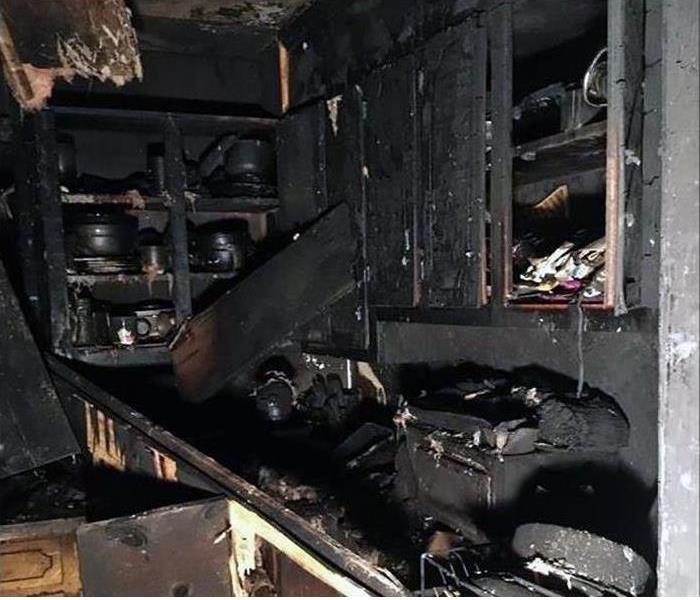Our Trained Technicians Are Available 24/7 To Restore Your Milford Home
8/7/2019 (Permalink)
 When it comes to fire damage our team has you covered. Our fire damage specialists have the equipment and expertise to handle any size fire.
When it comes to fire damage our team has you covered. Our fire damage specialists have the equipment and expertise to handle any size fire.
Understanding Protein-Based Fire Damage Residues in Milford
Protein-based residues can become an issue in the kitchen or another cooking area without visible flames in your Milford home. The greasy film and unpleasant odor develop when anything with protein-rich ingredients is overcooked. Not precisely soot, the coating consists of the substances remaining after the meat, dairy, or eggs burn down to a fine, oily concentrate. Evaporation, not combustion causes the problem.
When the roast or chops went past well-done to charcoal-like, the resulting Milford fire damage looks different from the fine ashy or thick sticky soot of paper or electrical fires. You might think chucking the hardened meat into the garbage and airing out the house is the solution.
Unfortunately, the evaporative process already sent tiny, oily droplets on air currents. Similarly to a more typical fire, the residues settle on cooler surfaces. If your HVAC system was operating, the oily mist hitches a ride and settles on walls, ceilings, and flat surfaces many rooms or stories away from the ruined meal.
SERVPRO technicians are familiar with this particular type of residue and can help remove it from any surface or item affected in your home by fire damage. The thin, almost invisible, and rancid-smelling debris attaches to many surfaces or materials. Clothing, wallpaper, window coverings, books, and furniture are all fair game for protein-based coatings and their odors.
Delay is not wise because the residues are corrosive and the stench long-lasting. Once you make the connection between the smell and the cooking disaster, SERVPRO crews can inspect all areas of your home. We seek evidence that the burned dinner remnants are now absorbing into porous materials of your home.
SERVPRO Fire and Smoke Restoration Technicians (FSRT) are uniquely qualified to work through this challenge. They are trained to match cleaning products, tools, and methods to the residues. Protein-based residues need cleaners that break down the bond between damaged surfaces and the coating. Solvents and abrasive tools or products that have abrasive ingredients, or both, are often helpful.
If the highly-odoriferous protein residues continue to cling and smell despite our efforts, SERVPRO might recommend using specialized paints or coatings to seal the pores of the affected structures. Sealing prevents the odors from continuously vaporizing.
SERVPRO of Merrimack has trained technicians, products, and tools to manage all kinds of fire damage residues. Call us at (603) 262-9293 if an overcooked meal caused surface damage and a noxious smell.
See more about Milford.






 24/7 Emergency Service
24/7 Emergency Service